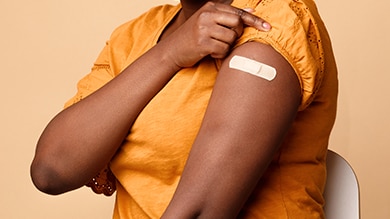Recommendations for Fully Vaccinated People
COVID-19 Homepage
Getting Your COVID-19 Vaccine
Get An Updated COVID-19 Vaccine
To find COVID-19 vaccine locations near you: Search vaccines.gov, text your ZIP code to 438829, or call 1-800-232-0233.
Most vaccination providers schedule appointments online.

Visit a vaccine provider’s online scheduling services to schedule your COVID-19 vaccination appointment.
Contact the vaccination provider directly to verify, reschedule, or cancel or with any questions about your appointment. CDC cannot schedule, verify, reschedule, or cancel a vaccination appointment.
Getting a COVID-19 vaccine after having COVID-19
You should get an updated COVID-19 vaccine even if you already had COVID-19.
- Getting a COVID-19 vaccine after you recover from COVID-19 infection provides added protection against the virus that causes COVID-19.
- People who already had COVID-19 and do not get vaccinated after their recovery are more likely to get COVID-19 again than those who get vaccinated after their recovery.
Talk to your doctor if you have questions about getting a COVID-19 vaccine.
Before Your Vaccination Appointment
Get a COVID-19 vaccine with your routine medical procedures and screenings
You can combine most procedures, screenings, and vaccinations at the same appointment when you get your COVID-19 vaccination. Talk to your healthcare provider if you have questions.
Children, teens, and adults may get a COVID-19 vaccine and other vaccines, including a flu vaccine, at the same time.
Preparing children and teens for vaccination
The experience of getting a COVID-19 vaccine will be very similar to that of getting routine vaccines. Learn how you can support your child and talk to them before they get a vaccine about what to expect.
Requesting accommodations at COVID-19 vaccination sites
- When making an appointment or arriving for vaccination, you can let staff and/or volunteers know you or your child might need some accommodations.
- People with disabilities can use the COVID-19 Vaccine Disability Information and Access Line (DIAL) to get help with COVID-19 vaccinations.
If you have allergies related to vaccines
Talk to your doctor to learn if you should get a different type of COVID-19 vaccine if you:
- have had a severe allergic reactionto a previous COVID-19 vaccine dose.
- are allergic to an ingredient in a COVID-19 vaccine.
- had an immediate allergic reaction (a reaction that started within 4 hours of getting vaccinated) to a COVID-19 vaccine, but the reaction was not considered severe by a medical professional.
During The Vaccination Appointment
- You should receive a paper or electronic factsheet. The factsheet tells you more about the COVID-19 vaccine you or your child received. Each approved and authorized COVID-19 vaccine has its own fact sheet that contains information to help you understand the risks and benefits of that vaccine.
- Paying for COVID-19 vaccines
- Most people can get no-cost updated COVID-19 vaccines through their private health insurance, Medicare, and Medicaid plans.
- Adults without health insurance and adults whose insurance does not cover all vaccine costs can get no-cost updated COVID-19 vaccine at healthcare providers, federally supported health centers, and select pharmacy locations participating in CDC’s Bridge Access Program.
- CDC’s Vaccines for Children (VFC) program provides vaccines at no cost to eligible children through health care providers enrolled in the program.
After Getting a COVID-19 Vaccine

Possible Side Effects After Getting a COVID-19 Vaccine
Side effects after getting a COVID-19 vaccine can vary from person to person. Some people experience a little discomfort and can continue to go about their day. Others have side effects that affect their ability to do daily activities. Side effects generally go away in a few days and tend to be mild and temporary, like those experienced after routine vaccinations. Even if you don’t experience any side effects, your body is building protection against the virus that causes COVID-19.
Common side effects can include:
- Pain, swelling, and redness on the arm where the shot was given.
- Tiredness, headache, muscle pain
- Chills
- Nausea
- Fever
Relieve Common Side Effects
- It is not recommended to take pain relievers or medicines, such as ibuprofen, aspirin (only for people ages 18 years or older), or acetaminophen before vaccination to try to prevent side effects.
- Talk to your doctor about taking over-the-counter pain relievers after your vaccine.
- If possible, get some rest.
- To relieve pain or swelling on the arm where you got the shot:
- Apply a clean, cool, wet washcloth over the area.
- Use or keep moving your arm.
- To reduce discomfort from fever:
- Drink plenty of fluids.
- Dress in comfortable clothes.
Talk to your child’s healthcare provider about giving your child a non-aspirin pain reliever and learn about other steps you can take at home to comfort your child after vaccination.
Call a doctor or healthcare provider about a side effect if:
- Redness or tenderness where the shot was given gets worse after 24 hours
- Side effects are worrying or do not seem to be going away after a few days
- After leaving a vaccination provider site, if you think you or your child might be having a severe allergic reaction, seek immediate medical care by calling 911.
Adverse events (serious health problems) after COVID-19 vaccination are rare
Adverse events after COVID-19 vaccination are rare, but can cause long-term health problems. They usually happen within six weeks of getting a vaccine. Learn more about the safety of COVID-19 vaccines.
Side effects and adverse events can be reported in Vaccine Adverse Event Reporting System (VAERS).
For Healthcare Workers
Use of COVID-19 Vaccines in the United States: Interim Clinical Considerations
To receive email updates about COVID-19, enter your email address: